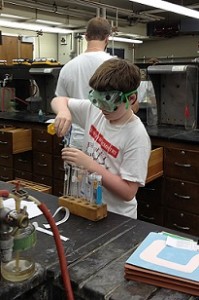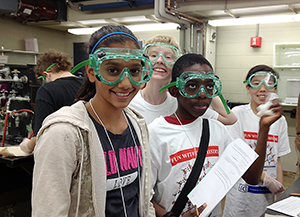To an outsider, room B371 in the UW-Madison Chemistry Building would have looked more like a middle school playground than a college lecture hall on a recent summer afternoon.
In fact, it was merely hosting the first week of the Institute for Chemical Education’s (ICE) ChemCamps—camps teaching chemistry lessons geared for students entering grades 5-8 this fall — and the students and counselors were meeting to touch base on their tasks for the day before moving on to the chemistry labs.
Following a pattern the campers had become used to throughout the week, the day began with a brief run through of lab safety rules and an introduction of the day’s chemistry lesson (monomers and polymers) before Francisca Jofre, ChemCamps instructor and ICE Outreach Specialist, raised her hand at the front of the room for the campers to quiet down.
The students knew what was coming next: the long-awaited lab demonstration.
While explaining the chemistry behind what they were seeing, a UW-Madison graduate student combined two solutions in a beaker, began to pull a thin thread from where the two liquid solutions met, and attached the thread to a roller. The two monomers had bonded together, creating a polymer — in this case nylon — which was slowly wound up around the roller.
Soon after, most students went with their camp counselors to the lab stations to begin their own investigations into the science behind monomers and polymers, while others — still mesmerized by the experiment — hung back to watch the rest of the nylon wind onto the roller.
“I want the kids to see science is fun and anybody can be a scientist,” Jofre says. “I think our culture portrays science as difficult and unapproachable by the average person.”
Established in 1984 by ICE — a center that works to revitalize science education through research and outreach — the ChemCamps program was originally created with funding from the National Science Foundation as a way to generate interest in science at a younger age.
“That [way] they would be able to take the appropriate courses they would need in middle school and high school, so that they would be able to get into college programs in science and potentially become scientists,” says John Moore, the director of ICE.
Over the years the goal has remained the same, while funding for the program has increasingly shifted to UW-Madison. Now in its 29th year, the ChemCamps program is self-sustaining in the Department of Chemistry each summer.
During each camp session — beginning with the first camp June 24 — 55 campers and 11 undergraduate camp counselors converge at the Chemistry Building for nearly three hours of chemistry experiments and lab demonstrations five days a week.
While this might seem like a long time to maintain the interest of young students, Jofre says keeping the campers involved and giving them the opportunity to investigate the experiments that interest them holds their attention.
The key, she says, is helping beginning chemists realize that science doesn't have to involve complicated concepts or difficult experiments, but instead can be simple to understand and investigate. The program’s hope is that students get to see chemistry in a new way, different from their science textbooks, by learning in a more hands-on environment.
The result: ChemCamps is quickly gaining interest from parents and middle school students alike.
In anticipation of higher enrollment this summer, Jofre hired an 11th camp counselor, which allowed ChemCamps to accommodate five more students each week than it did last summer.
But even that hasn't been enough to keep up with the demand.
All of the camps have sold out for the summer. And there’s growing interest from across the country: This summer, students have come from Minneapolis, Chicago and even New York.
Jofre and Moore say the opportunity to see young students take such an interest in science is more than enough reward for all their efforts.
“I love how they are [in awe] of science and want to fully participate in all the activities,” Jofre says. “These kids want you to teach them new things. [They] want to learn about science.”

